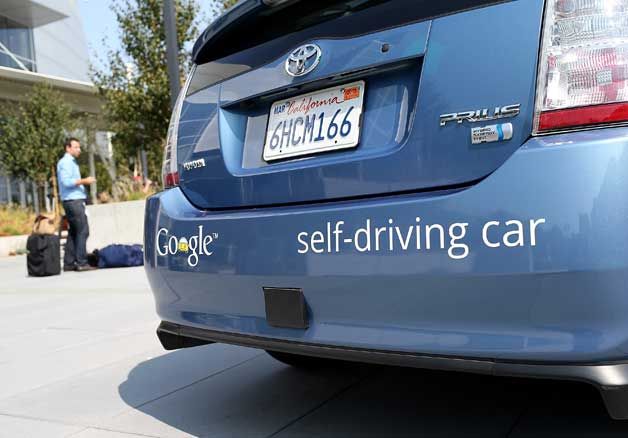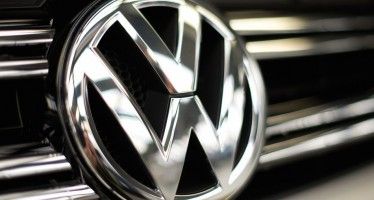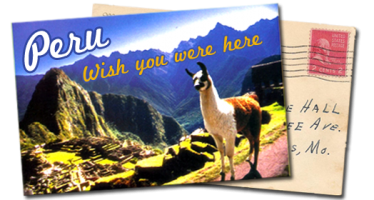DMV won’t unleash robocars on CA roads
 California’s Department of Motor Vehicles has put the brakes on driverless cars. Although the agency’s new proposed regulations would technically allow new self-driving vehicles on Golden State streets, the strict regulations surrounding their use would all but foreclose the fully automated future envisioned by new and established car companies vying to dominate the new market.
California’s Department of Motor Vehicles has put the brakes on driverless cars. Although the agency’s new proposed regulations would technically allow new self-driving vehicles on Golden State streets, the strict regulations surrounding their use would all but foreclose the fully automated future envisioned by new and established car companies vying to dominate the new market.
The draft regulations, issued last week, “would mandate that autonomous vehicles be operated by a licensed driver who could take over if necessary. That driver would also be on the hook for traffic violations,” as the New York Times reported.
Automakers, meanwhile, faced a litany of potentially cumbersome requirements. “The manufacturers of self-driving cars would have to subject their vehicles to a third-party safety test. And they would apply for three-year permits that would allow them to lease but not sell self-driving cars to the public,” the paper noted. “Manufacturers would also have to regularly report accidents, come up with security measures to prevent hackers from taking over cars, and tell passengers what kind of data, beyond whatever information is needed to safely run the car, the companies are collecting about them.”
Broad challenges
From both the public and private sector, criticism has been swift. The DMV’s “incomplete rules came more than 11 months after the department’s deadline,” as the Los Angeles Times observed. “Google said Wednesday that it was ‘gravely disappointed,’ and that the aim of its program is to improve safety on roads,” the Times added, while Lt. Gov. Gavin Newsom “warned last week that the rules might be too onerous and block innovation.”
“Meanwhile, the U.S. Department of Transportation, which declined to comment on California’s rules, has focused most of its efforts on a narrow slice of robotic safety. It is addressing communication signals between autonomous vehicles, but not the broader question of determining if these robot cars will be safe.”
Beltway observers hoped to land objections to the California regulations that might reverberate at the federal level in the future. “As currently constructed, these proposed rules work at cross-purposes with operator and passenger safety and with the state’s desire to ensure a livable planet in the future,” wrote R Street’s Ian Adams in a Sacramento Bee op-ed. “But given some thoughtful modifications, they could present a real opportunity for California to lead the world into its next era of transportation.”
Some tech watchers have claimed that the DMV’s proposed rules would actually create greater driver risk in their push for safety. Earlier this year, in remarks at the influential SXSW conference, Google’s Astro Teller had cast doubt on the idea that human drivers would increase protections inside self-driving cars. “Even though people had sworn up and down ‘I’m going to pay so much attention,’ people do really stupid stuff when they’re driving,” he said, according to Forbes. “The assumption that humans could be a reliable back up for the system was a total fallacy!”
Forging ahead
Nevertheless, new-entrant car companies like Google, as well as traditional automakers, have determined to forge ahead with self-driving and driverless projects. Ford has been heavily rumored to have struck a collaborative partnership with Google, with an announcement expected in January. “In September, Google hired former Ford and Hyundai executive John Krafcik as CEO of Google’s Self-Driving Car Project,” the Chicago Tribune noted, while former Ford CEO Alan Mulally sits on Google’s board of directors. “Google parent Alphabet is planning to make the project its own unit to compete in the car-sharing business,” the Tribute reported.
This month, Ford joined the ranks of self-driving contenders signed up with California’s mandated Autonomous Vehicle Testing Program. “Manufacturers working on autonomous driving vehicles in California that want to test these vehicles on the streets need to enroll,” as Silicon Angle noted — a requirement that has so far drawn compliance from a litany of big names. “Volkswagen Group of America, Mercedes-Benz, Google, Delphi Automotive, Tesla Motors, Bosch, Nissan, Cruise Automation, BMW and Honda” have all signed up, according to the site.
Related Articles
CA regulators demand VW recall
California’s powerful environmental regulator has ordered the recall of all Volkswagens, Audis and Porsches equipped with software secretly installed to defeat
State officials report expensive gifts and luxury trips
State lawmakers and constitutional officers accepted hundreds of thousands of dollars in international travel, fine wines, rounds of golf and
Correa could benefit from his bill to accept late ballots
Former state Sen. Lou Correa, D-Anaheim, is down but not out of the race for the Orange County Board of Supervisors.




